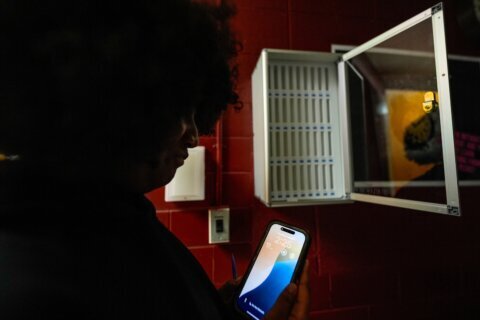From vaping, the cost of supplies to cellphone policies, the WTOP team is studying up on hot-button topics in education across the D.C. region. Follow our series “WTOP Goes Back to School” on air and online this August and September.
Most kids and teens who use e-cigarettes hope to cut the habit. But e-cigarettes continue to be the most common form of tobacco product for young people in the U.S., according to the Centers for Disease Control and Prevention.
That’s not for lack of effort on the part of public servants, families and educators.
Oftentimes, kids are vaping when they aren’t being supervised, educators and experts told WTOP. Efforts to block kids from vaping haven’t resolved the issue.
Dr. Natalie Gospodinoff is a tobacco control coordinator who works in Northern Virginia with the state’s department of health.
“Anyone from parents, caregivers, (to) educators play a crucial role in informing youth about the dangers of vaping, and also in providing resources on how to quit,” Gospodinoff said.
Gospodinoff’s program helps prevent nicotine use in young people and promotes quitting, she said.
Those adults hoping to get through to young people about the dangers of vaping are up against stiff competition, starting with attitudes toward the product in general.
Misconceptions about safety
Some kids may see vaping as less dangerous than cigarettes, but e-cigarettes pose plenty of health risks.
“There is this misconception that vaping is harmless, but we have all of this emerging research that suggests otherwise,” Gospodinoff said.
She said kids haven’t come to that impression on their own.
Companies that sold cigarettes in the ’90s were accused of marketing toward kids with cartoon characters and flashy packaging of flavored cigarettes placed low on shelves at the eye-level of kids. The approach of using cartoons in advertising drugs has since been banned, but vape companies today are facing similar criticisms of their marketing from health advocates.
Vape companies sometimes put e-cigarettes in packaging that’s as colorful as a candy wrapper. And the product is just as sweet with a variety of flavors. Critics and health experts said that’s contributed to a false sense of security among kids who see vaping as a healthier alternative to smoking cigarettes.
Domenique Ross is a substitute teacher in D.C. Public Schools and a volunteer with the Truth Initiative, a nonprofit that combats tobacco and nicotine.
“Similar to when cigarettes were first introduced to our parents and grandparents, they didn’t understand the impacts, but they thought it looked cool,” Ross said, referring to the kids she met through volunteering in D.C.
Jared Bridges teaches at a high school in Prince William County, Virginia. He said even though students are not legally old enough to partake, they’ll argue that since substances are legal, they’re OK to use.
“They bring these things to school. They’re not in the right state of mind,” Bridges said. “They’re missing class. It’s just a discipline issue all around.”
Like every generation, some have pegged teens as seeing themselves as “invincible” — an outlook that Bridges believes contributes to vape use.
A desire to fit in
Nia Naylor, 22, also volunteers with the Truth Initiative. She spoke with teens at a D.C. summer camp about nicotine.
Based on her conversations with those young people, she said some students are vaping to be social with friends or mimicking adults they see who use tobacco products.
“She saw a lot of her family members using it, so it was more so of a ‘Why not? It’s what I see everybody else doing.’” Naylor said of one student.
Related Stories:
- School districts across DC region return to class
- Proposed policy would prohibit student cellphone use at elementary and middle schools in Arlington
- Fairfax Co. expands cellphone storage pilot program to include 9 high schools
Mental health and addiction
Students who vape are more likely to report symptoms of anxiety, depression or suicidal thoughts than their peers, according to a study by the American Heart Association, which surveyed 2,500 people between the ages of 13 and 24 last year.
Naylor said students told her they’ve used e-cigarettes to deal with stress.
“The student was actually able to say that it didn’t necessarily help them, but she felt like it did at the time,” Naylor said.
Getting through to kids who need help
Given that students are often turning to nicotine to manage stress, Naylor said students need to be offered an alternative.
“’Instead of smoking, you can use this as another outlet.’ So whether it be chewing gum or giving them other activities that they can do that will give them a sense of release,” Naylor said.
Help could come in the form of sharing resources on the harms of tobacco and nicotine consumption, and guidance on how to cut down on vaping or quit altogether.
Schools and parents play a role in getting kids to understand the risks associated with e-cigarettes from a young age, said David Walrod, president of the Fairfax County Federation of Teachers.
“A student shouldn’t be hearing for the first time when they’re in seventh grade, ‘Oh, you shouldn’t be vaping,’” he said.
Walrod said he’s interested in Fairfax County schools doing more to address vaping because of the health concern it presents to students.
Bridges, who has taught in Northern Virginia for 10 years, is among the teachers who think addiction plays a role in students bringing e-cigarettes to school.
He said schools need to find a way to be proactive.
“If you sit with today’s youth and you talk at them instead of with them, or if you just lecture them, they’re not going to respond, and that’s not how you can reach them,” Bridges said.
Gospodinoff added that kids are more susceptible to becoming addicted to nicotine because their brains are still developing.
“This is an addiction,” Gospodinoff said. “If someone … is found using a vape in school, what that person needs is help.”
Anyone 13 years or older who is hoping to quit can call 1-800-QUIT-NOW. Those operators come up with programs tailored to your needs.
“There is no judgment if you are using tobacco, if you’re using e-cigarettes,” Ross said. “I just want students to know that there is support for those who are trying to quit.”
Get breaking news and daily headlines delivered to your email inbox by signing up here.
© 2024 WTOP. All Rights Reserved. This website is not intended for users located within the European Economic Area.








